Lincoln, Nebraska Blood Testing Facilities
 Represents a LabCorp blood testing facility
Represents a LabCorp blood testing facility Represents a Quest Diagnostics blood testing facility
Represents a Quest Diagnostics blood testing facility

Nearby Labcorp Blood Testing facilities:
- Labcorp Center Distance: 3 m, 1500 S 48Th St Ste 414, Lincoln, Lancaster County, NE, 68506
- Labcorp Center Distance: 46 m, 7615 Cass St., Omaha, Douglas County, NE, 68114
Nearby Quest Blood Testing facilities:
- Quest Center Distance: 4 m, 1001 S 70Th St, Lincoln, Lancaster County, NE, 68510-7901
- Quest Center Distance: 45 m, 10020 Nicholas St, Omaha, Douglas County, NE, 68114-2188
Lincoln Hormone Replacement Therapy Services
Hormone Optimization and Restoration represent 21st century solutions to the way that we cope with aging and preserve health and wellness throughout the lifespan. Aging is complex, and we are years upon years away from recognizing the full range of mechanisms at play with regard to the aging process, but one thing has become increasingly clear after generations of research—Hormone Imbalance and Deficiency are key players in the aging process, and the depletion of our Hormone Levels hastens the physiological decline associated with aging.
At the Conscious Evolution Institute, we understand the role that Hormone Balance plays in health and wellness, and we specialize in Hormone Replacement Regimens that help our patients maintain their physiological well-being as they grow older, facilitating improved quality of life and, potentially, longevity. If you live in the Lincoln, Nebraska area, and are interested in the Hormone Therapies that we provide, we encourage you to give us a call at the number listed at the top of this page, or fill out the form to your right in order to arrange for a time to speak with a qualified Hormone Specialist that can answer any questions that you may have and arrange for an appointment with an HRT Doctor in Lincoln.
Lincoln Growth Hormone Injection Therapy for the Treatment of Age-Associated HGH Deficiency
Human Growth Hormone is one of the most vital hormones produced by the human body, and is released by the pituitary gland in order to regulate the body's metabolism at a cellular level. Early in life, Growth Hormone promotes the literal growth associated with childhood and puberty, but, as HGH Levels drop to levels associated with adulthood, the primary function of Human Growth Hormone is to maintain and facilitate normal and optimal function.
Beginning around 30 years of age, HGH Production falls into a state of permanent decline, which eventually prevent the body from adequately preserving and regenerating itself, leading to the chronic health decline of various organs and systems. HGH Injection Therapy can help mitigate the negative effects of this decline and help you live a healthier life.
Lincoln Sermorelin Acetate to Restore Healthy Pituitary Function
Along with Bio-Identical HGH, our Lincoln Hormone Clinic also offers Sermorelin Acetate, which has been shown to be just as effective in the treatment of Adult-Onset HGH Deficiency, if not moreso, than traditional Growth Hormone Shots. Sermorelin works by directly stimulating the brain to produce Human Growth Hormone, while also being appropriately mediated by other hormones in the body, including Somatostatins, which allow the body to produce the ideal amount of HGH that it needs, when it needs it, to meet the needs of the body. Sermorelin is cheaper than Human Growth Hormone, and allows for more natural biological rhythms, which makes it popular among many HRT Doctors and their patients.
Lincoln Testosterone Replacement Therapy for Age-Related Low-T and Andropause
Testosterone HRT is perhaps the most popular and common form of Hormone Replacement in America today, with millions of patients nationwide choosing the treatment in order to restore their sexual desire and potency. What most people don't realize is that Testosterone is not only the central component of sexual health, but it is also a key component of overall health and wellness as well. Men with Low-T are more likely to be overweight, diabetic, fatigued, and depressed, and are more likely to suffer from cardiovascular issues and complications such as hypertension, heart disease, and atherosclerosis. We can arrange for a Complete Metabolic Hormone Panel to be performed on your behalf in order to uncover your underlying Hormone Status and help you decide if Testosterone Patches, Creams, or Injections are the right choice for you.
Lincoln HCG Therapy Treatments to Help You Lose Weight
Did you know that there are specific Hormone Treatments that are designed to help you quickly and effectively lose weight? Have you struggled with traditional diets without luck? HCG Injection Therapy may be the option that you've been looking for. The HCG Diet is a special diet, combining Caloric Restriction with daily HCG Injections, which has helped men and women across the country experience fantastic weight loss while reducing the effects of hunger and fatigue that normally plague patients that attempt such low calorie diets. HCG helps curb both cravings and hunger while encouraging the body to burn fat over muscle. If you are looking for a Lincoln HRT Diet Clinic, contact us today to learn more!
Lincoln Nebraska Information
The city of Lincoln is most notable nationwide for being the home of the University of Nebraska, whose Cornhuskers are one of the powerhouses of the Big Ten Conference. The Lincoln economy revolves primarily around two sectors: manufacturing and service, though technology is becoming a stronger component of the regional economy with every passing year. Lincoln is notable for having weathered the recession of 2008, remaining strong, and maintains a remarkably low unemployment rate.
Nebraska is home to one major military facility: the Joint Force Headquarters of the National Air and Army National Guard. Being a college town, as well as the capital of the state, Lincoln brings has a strong presence on the national musical touring circuit, and has a number of fantastic music venues, including Zoo Bar, Duggan's Pub, Knickerbockers, Duffy's Tavern, and Pinnacle Bank Arena. Other things to see and do in Lincoln include watching a Cornhuskers game at Memorial Stadium, visiting the Love Library, or the Johnny Carson Theater. Museums in Lincoln include the Great Plains Art Museum, the Eisentrager Howard Gallery, and the Bob Devaney Sports Center.
All About Lincoln, Nebraska Geographic Area
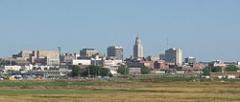
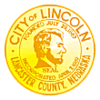
The City of Lincoln is the capital and the second-most populous city of the US state of Nebraska, after Omaha. Lincoln is also the county seat of Lancaster County and the home of the University of Nebraska. Lincoln's 2010 Census population was 258,379.
Lincoln was founded in 1856 as the village of Lancaster, and became the county seat of the newly created Lancaster County in 1859. The capital of Nebraska Territory had been Omaha since the creation of the territory in 1854; however, most of the territory's population lived south of the Platte River. After much of the territory south of the Platte considered annexation to Kansas, the legislature voted to move the capital south of the river and as far west as possible. The village of Lancaster was chosen, in part due to the salt flats and marshes.
Omaha interests attempted to derail the move by having Lancaster renamed after the recently assassinated President Abraham Lincoln. Many of the people south of the river had been sympathetic to the Confederate cause in the recently concluded Civil War, and it was assumed that the legislature would not pass the measure if the future capital were named after Lincoln. The ploy did not work, as Lancaster was renamed Lincoln and became the state capital upon Nebraska's admission to the Union on March 1, 1867. The choice to name the capital city "Lincoln" caused quite a stir among constituents, whose sentiments were mixed regarding who should have won the Civil War.
In 2008 Lincoln had been topping the CDC list of healthiest U.S. cities.
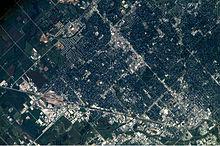
Lincoln is located at 40 °48 a²35 a³N 96 °40 a²31 a³W / 40.80972 °N 96.67528 °W / 40.80972; -96.67528 (40.809868, na96.675345). According to the United States Census Bureau, the city has a total area of 90.36 square miles (234.03 km ²), of which, 89.11 square miles (230.8 km ²) of it is land and 1.25 square miles (3.23 km ²) is water. 74.6 square miles (193 km2) of it is land and 0.7 square miles (1.8 km2) of it (0.98%) is water.
Lincoln is one of the few large cities of Nebraska not located along either the Platte River or the Missouri River. The city was originally laid out near Salt Creek and among the nearly flat saline wetlands of northern Lancaster County. The city's growth over the years has led to development of the surrounding land, much of which is composed of gently rolling hills. In recent years, Lincoln's northward growth has encroached on the habitat of the endangered Salt Creek tiger beetle.
The Lincoln metropolitan area consists of Lancaster County and Seward County, which was added to the metropolitan area in 2003. Lincoln has very little development outside its city limits and has no contiguous suburbs (the largest town that can be considered a suburb of Lincoln is Waverly.) This is due primarily to the fact that most land that would otherwise be developed as a suburban town has already been annexed by the city of Lincoln itself.
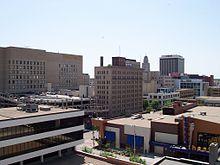
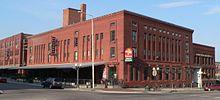
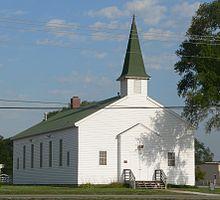
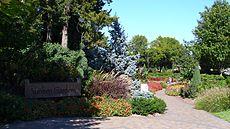
Lincoln has an extensive park system, with over 125 individual parks. The largest parks in Lincoln's park system are Wilderness Park, Pioneers Park and Pioneers Park Nature Center, Holmes Park, Oak Lake Park, Max E. Roper Park, Tierra Park, Antelope Park (which contains the Lincoln Children's Zoo, the Sunken Gardens, and the Bicentennial Cascade Fountain), and Mahoney Park. The parks are connected by a 128 mi (206 km) system of recreational trails. The MoPac Trail extends through Lincoln.
Lincoln, located on the Great Plains far from the moderating influence of mountains or large bodies of water, possesses a highly variable four-season humid continental climate (Koppen Dfa): winters are cold but relatively dry, summers are hot and occasionally humid. With little precipitation falling during winter, precipitation is concentrated in the warmer months, when thunderstorms frequently roll in, often producing tornadoes. Snow tends to fall in light amounts, though blizzards are possible. Snow cover is not very reliable due to both the dryness and the frequent thaws during winter.
Monthly averages range from 22.4 °F ( na5.3 °C) in January to 77.8 °F (25.4 °C) in July. However, the city is subject both to episodes of bitter cold in winter and heat waves during summer, with 14 nights below 0 °F ( na18 °C), 40 days above 90 °F (32 °C), and 5 days above 100 °F (38 °C). Temperature extremes have ranged from na33 °F ( na36 °C) in January 1974 to 108 °F (42 °C) in July 1995.
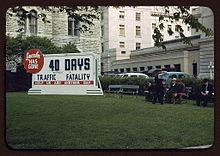
Lincoln has a mayor-council government. The mayor and a seven-member city council are selected in nonpartisan elections. Four members are elected from city council districts; the remaining three members are elected at-large. Lincoln's health, personnel, and planning departments are joint city/county agencies; most city and Lancaster County offices are located in the County/City Building.
Since Lincoln is the state capital, many Nebraska state agencies and offices are located in Lincoln, as are several United States Government agencies and offices. The city lies within the Lincoln Public Schools school district; the primary law enforcement agency for the city is the Lincoln Police Department. The Lincoln Fire and Rescue Department shoulders the city's fire fighting and ambulatory services while outlying areas of the city are supported by volunteer fire fighting units.
The city's public library system is Lincoln City Libraries, which has eight branches. Lincoln City Libraries circulates more than three million items per year to the residents of Lincoln and Lancaster County. Lincoln City Libraries is also home to Polley Music Library and the Jane Pope Geske Heritage Room of Nebraska authors.
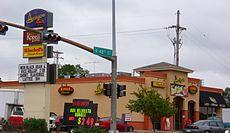
Lincoln's economy is fairly typical of a mid-sized American city; most economic activity is derived from service industries. The state government and the University of Nebraska-Lincoln are both large contributors to the local economy. Other prominent industries in Lincoln include medical, banking, information technology, education, call centers, insurance (such as Ameritas Life Insurance Company and Allstate Insurance subsidiary Lincoln Benefit Life), and rail and truck transport.
One of the largest employers is the BryanLGH Medical Center, which consists of two major hospitals and several large outpatient facilities located across the city. Healthcare and medical jobs account for a substantial portion of Lincoln's employment: as of 2009, full-time healthcare employees in the city included 9,010 healthcare practitioners in technical occupations, 4,610 workers in healthcare support positions, 780 licensed and vocational nurses, and 150 medical and clinical laboratory technicians.
Several national business were originally established in Lincoln; these include student lender Nelnet, Fort Western Stores and HobbyTown USA. Several regional restaurant chains began in Lincoln, including Amigos/Kings Classic, Runza Restaurants, and Valentino's.
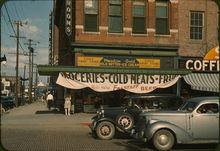
Amtrak, the national passenger rail system, provides service to Lincoln, operating its California Zephyr daily in each direction between Chicago and Emeryville, California, across the bay from San Francisco.
A public bus transit system, StarTran, operates in Lincoln. StarTran's fleet consists of 60 full-sized buses and 9 Handi-Vans.
The Lincoln Airport provides passengers with daily non-stop service to United Airlines hubs O'Hare International Airport and Denver International Airport as well as Delta Air Lines hub Minneapolis-Saint Paul International Airport. Regional jet service on Delta Air Lines to Salt Lake City and Atlanta was discontinued in 2009. In the past Allegiant Air departed Wednesdays and Saturdays to McCarran International Airport in Las Vegas aboard their fleet of MD-80s. However, this service has ended in Lincoln and has been transferred to the Central Nebraska Regional Airport. The Lincoln Airport is also among the emergency landing sites for the NASA Space Shuttle.
As of the census of 2010, there were 258,379 people, 103,546 households, and 60,300 families residing in the city. The population density was 2899.4 people per square mile (1119.5/km ²). There were 110,546 housing units at an average density of 1240.5 per square mile (479/km ²). The racial makeup of the city was 86.0% White, 3.8% African American, 0.8% Native American, 3.8% Asian, 0.1% Pacific Islander, 2.5% from other races, and 3.0% from two or more races. Hispanic or Latino of any race were 6.3% of the population.
There were 103,546 households out of which 27.7% had children under the age of 18 living with them, 44.0% were married couples living together, 10.2% had a female householder with no husband present, 4.1% had a male householder with no wife present, and 41.8% were non-families. 31.3% of all households were made up of individuals and 8.8% had someone living alone who was 65 years of age or older. The average household size was 2.36 and the average family size was 3.01.
The median age in the city was 31.8 years. 22.7% of residents were under the age of 18; 15.7% were between the ages of 18 and 24; 27.9% were from 25 to 44; 22.9% were from 45 to 64; and 10.7% were 65 years of age or older. The gender makeup of the city was 50.0% male and 50.0% female.
As of 2000 the median income for a household in the city was $40,605, and the median income for a family was $52,558. Men had a median income of $33,899 versus $25,402 for women. The per capita income for the city was $20,984. About 5.8% of families and 10.1% of the population were below the poverty line, including 10.7% of those under age 18 and 6.0% of those age 65 or over.
The U.S. Government designated Lincoln as a refugee-friendly city due to its stable economy, educational institutions, and size. Since then, refugees from Vietnam settled in Lincoln, and further waves came from other countries.
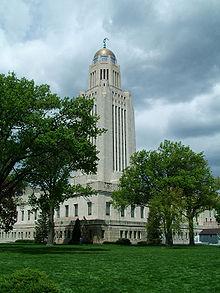
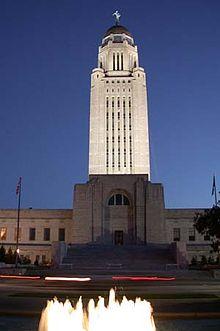
Lincoln Public Schools is the sole public school district in the city. There are six traditional high schools in the district: Lincoln High, East, Northeast, North Star, Southeast, and Southwest. Additionally, Lincoln Public Schools is home to special interest high schools including the Arts and Humanities Focus Program, the Zoo School, the Information Technology Focus Program, and the Entrepreneurship Focus Program.
There are several private parochial elementary and middle schools located throughout the community. These schools, like Lincoln Public Schools, are broken into districts, but most will allow attendance outside of boundary lines.
Private high schools located in Lincoln are College View Academy, Lincoln Christian, Lincoln Lutheran, Parkview Christian and Pius X High School.
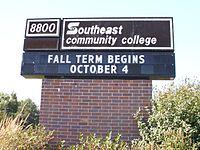
The University of Nebraska aeLincoln, the flagship campus of the University of Nebraska system, is the largest university in Nebraska. Other colleges and universities based in Lincoln are: BryanLGH College of Health Sciences, Nebraska Wesleyan University, Southeast Community College and Union College.
Colleges and universities with satellite locations in Lincoln are Bellevue University, Concordia University, Nebraska, College of Saint Mary, Doane College, and Kaplan University.
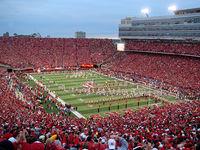
Lincoln is best known for the university's football team, the Nebraska Cornhuskers. In total, the University of Nebraska fields 21 men's and women's teams in 14 NCAA Division I sports. Other sports teams are the Lincoln Saltdogs, an American Association independent minor league baseball team; the Lincoln Stars, a USHL junior ice hockey team. Lincoln is also home to the No Coast Derby Girls, a member of the Women's Flat Track Derby Association.
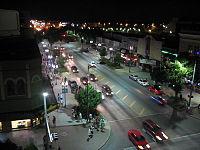
Lincoln's primary venues for live music include: Pershing Auditorium (large tours and national acts), Bourbon Theatre, Duffy's Tavern, Red9 (opened in 2009, previously P.O. Pears), Knickerbockers, Duggan's Pub (local and regional acts; smaller venues), and the Zoo Bar (blues). The Pla-Mor Ballroom is a staple of Lincoln's music and dance scene, featuring its house band, the award-winning Sandy Creek Band.
The Lied Center is a venue for national tours of Broadway productions, concert music, and guest lectures. Lincoln has several performing arts venues. Plays are staged by UNL students in the Temple Building; community theater productions are held at the Lincoln Community Playhouse, the Loft at The Mill, and the Haymarket Theater.
For movie viewing, Marcus Theatres owns 32 screens at four locations, and the University of Nebraska's Mary Riepma Ross Media Arts Center shows independent and foreign films. Standalone cinemas in Lincoln include the Joyo Theater and Rococo Theater. The Rococo Theater also hosts benefits and other engagements.
The downtown section of O Street is Lincoln's primary bar and nightclub district.
Lincoln is the hometown of Zager and Evans, known for their international No. 1 hit record, "In the Year 2525". It is also the home town of several notable musical groups, such as Remedy Drive, VOTA, the Bathtub Dogs, For Against, Lullaby for the Working Class, Ideal Cleaners, Matthew Sweet, Dirtfedd and The Show is the Rainbow. Lincoln is also home to Maroon 5 guitarist James Valentine.
Lincoln has four licensed broadcast television stations:
The headquarters of Nebraska Educational Telecommunications (NET), which is affiliated with the Public Broadcasting Service, National Public Radio and Public Radio International, are in Lincoln.
Lincoln is one of the few cities without its own NBC affiliate; Omaha's WOWT serves as the city's default NBC affiliate on cable, while Hastings' KHAS-TV is available in satellite locals packages. Most of Omaha's other television stations can also be picked up in Lincoln with an antenna, and all are available on cable.
Lincoln also has analog TV translators for 3ABN on channel 27 and TBN on channel 29.
There are 22 radio stations in Lincoln.
FM stations include:
AM stations include:
Most areas of Lincoln also receive radio signals from Omaha and other surrounding communities.
The Lincoln Journal Star is the city's major daily newspaper. The Daily Nebraskan is the official campus paper of the University of Nebraska-Lincoln. The DailyER Nebraskan is the University of Nebraska-Lincoln's biweekly satirical paper. The Clocktower is the official campus paper of Union College.

Word Count: 3115





